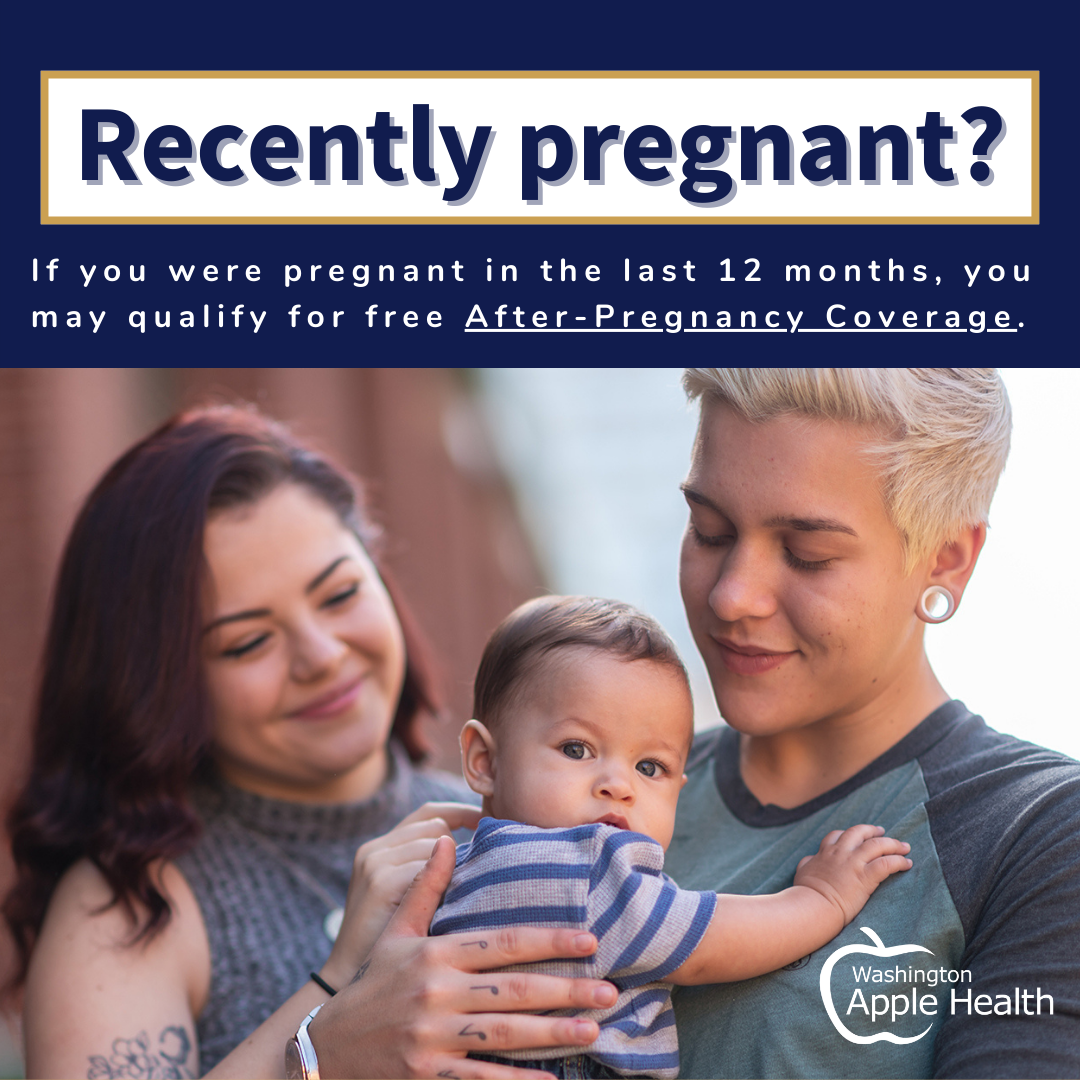After-Pregnancy Coverage, the new program won by advocates in 2021 to expand Medicaid coverage after pregnancy, is now available. The program will help thousands of Washingtonians gain access to coverage during a critical time and help address our state’s maternal health crisis.
Who is eligible and what does it cover?

Starting this month, if you have Apple Health (Medicaid) coverage and report a pregnancy, you are eligible for coverage for 12 months. Coverage begins the first day after your pregnancy ends and continues even if you experience a change in income or in the number of household members. Coverage begins automatically if the pregnancy is reported with an end date.
If you aren’t already enrolled in Apple Health, you can still apply to get coverage if your pregnancy ended within the last year and you meet income requirements. The program’s income threshold is higher, and more accessible, than normal Apple Health requirements: about $3,000 a month for a pregnant person, or more for larger households (198% of federal poverty level).
Coverage is available to women and birthing individuals, regardless of immigration status, and covers trans and gender non-conforming populations. Benefits are available not only for pregnancies that result in birth, but also in the case of a miscarriage or abortion.
Why this program matters
Programs like this one are critical for addressing our nation’s maternal health crisis and erasing racial disparities.
The new program will:
- Save lives: Extending coverage will help stop preventable deaths by expanding access during a critical time. More women die of pregnancy-related causes in the United States every year than in any other wealthy nation – and the rate has skyrocketed by more than 50 percent in recent years.
- Address racial disparities: American Indian and Alaska Native women are 9 times more likely than white women to die from a pregnancy related cause in Washington state. Nationally, Black women are 3.5 times more likely and Native women are two times more likely to die as white women in the year following childbirth due to factors linked to structural racism and toxic stress, underscoring the importance of post-partum coverage that continues beyond the previous 60-day period. The White House recognized Black Maternal Health Week in April 2021 for the first time.
- Improve maternal mental and physical health: Medical issues following pregnancy can include depression and anxiety, hemorrhaging, problems with breastfeeding, and trouble managing stress and substance use. The American College of Obstetricians and Gynecologists found that 25 percent of women experience depressionafter giving birth. Rates are higher among women of color and low-income women. Extending coverage to one year will help providers track pregnancy-related and existing health issues.
- Protect babies: Healthier parents mean healthier babies. Although infants receive health insurance coverage if they are in low-income households, babies suffer if moms can’t access coverage and end up foregoing care. Skipping follow-up care can result in pregnancy related and existing health issues going undetected, affecting a parent’s ability to care for their newborn.
A bill so good it passed twice
The Washington State Legislature passed the bill two years in a row but it was vetoed in 2020 due to the COVID-related budget crisis. Advocates returned in 2021 and worked with legislative and community partners to fully pass the bill into law (SB 5068). EOI was proud to partner with over 30 organizations to help pass this bill to address our state’s maternal health crisis. Senator Emily Randall sponsored the bill both years.
Check out the program’s new webpage to learn more and see detailed eligibility and benefit information.
More To Read
April 26, 2024
What is WA Cares and Why Does It Matter for Washingtonians?
We need to defend this important policy from billionaires looking to save a buck
April 3, 2024
Report: 87% of WA Hospitals are Falling Behind on Community Investment Requirements
Non-profit hospitals are supposed to invest in communities – but many aren’t.
February 22, 2024
Why Is Health Care Declining in Washington? Look to Hospital Consolidation
People are hurting in our state. And it’s no accident.
